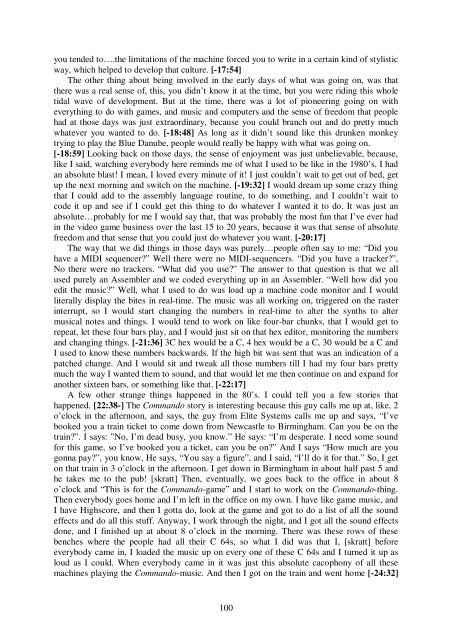Musikaliska uttryck och funktioner i interaktiva v rldar - C64.com
Musikaliska uttryck och funktioner i interaktiva v rldar - C64.com
Musikaliska uttryck och funktioner i interaktiva v rldar - C64.com
You also want an ePaper? Increase the reach of your titles
YUMPU automatically turns print PDFs into web optimized ePapers that Google loves.
you tended to….the limitations of the machine forced you to write in a certain kind of stylistic<br />
way, which helped to develop that culture. [-17:54]<br />
The other thing about being involved in the early days of what was going on, was that<br />
there was a real sense of, this, you didn’t know it at the time, but you were riding this whole<br />
tidal wave of development. But at the time, there was a lot of pioneering going on with<br />
everything to do with games, and music and computers and the sense of freedom that people<br />
had at those days was just extraordinary, because you could branch out and do pretty much<br />
whatever you wanted to do. [-18:48] As long as it didn’t sound like this drunken monkey<br />
trying to play the Blue Danube, people would really be happy with what was going on.<br />
[-18:59] Looking back on those days, the sense of enjoyment was just unbelievable, because,<br />
like I said, watching everybody here reminds me of what I used to be like in the 1980’s. I had<br />
an absolute blast! I mean, I loved every minute of it! I just couldn’t wait to get out of bed, get<br />
up the next morning and switch on the machine. [-19:32] I would dream up some crazy thing<br />
that I could add to the assembly language routine, to do something, and I couldn’t wait to<br />
code it up and see if I could get this thing to do whatever I wanted it to do. It was just an<br />
absolute…probably for me I would say that, that was probably the most fun that I’ve ever had<br />
in the video game business over the last 15 to 20 years, because it was that sense of absolute<br />
freedom and that sense that you could just do whatever you want. [-20:17]<br />
The way that we did things in those days was purely…people often say to me: “Did you<br />
have a MIDI sequencer?” Well there were no MIDI-sequencers. “Did you have a tracker?”,<br />
No there were no trackers. “What did you use?” The answer to that question is that we all<br />
used purely an Assembler and we coded everything up in an Assembler. “Well how did you<br />
edit the music?” Well, what I used to do was load up a machine code monitor and I would<br />
literally display the bites in real-time. The music was all working on, triggered on the raster<br />
interrupt, so I would start changing the numbers in real-time to alter the synths to alter<br />
musical notes and things. I would tend to work on like four-bar chunks, that I would get to<br />
repeat, let these four bars play, and I would just sit on that hex editor, monitoring the numbers<br />
and changing things. [-21:36] 3C hex would be a C, 4 hex would be a C, 30 would be a C and<br />
I used to know these numbers backwards. If the high bit was sent that was an indication of a<br />
patched change. And I would sit and tweak all those numbers till I had my four bars pretty<br />
much the way I wanted them to sound, and that would let me then continue on and expand for<br />
another sixteen bars, or something like that. [-22:17]<br />
A few other strange things happened in the 80’s. I could tell you a few stories that<br />
happened. [22:38-] The Commando story is interesting because this guy calls me up at, like, 2<br />
o’clock in the afternoon, and says, the guy from Elite Systems calls me up and says, “I’ve<br />
booked you a train ticket to come down from Newcastle to Birmingham. Can you be on the<br />
train?”. I says: ”No, I’m dead busy, you know.” He says: “I’m desperate. I need some sound<br />
for this game, so I’ve booked you a ticket, can you be on?” And I says “How much are you<br />
gonna pay?”, you know, He says, “You say a figure”, and I said, “I’ll do it for that.” So, I get<br />
on that train in 3 o’clock in the afternoon. I get down in Birmingham in about half past 5 and<br />
he takes me to the pub! [skratt] Then, eventually, we goes back to the office in about 8<br />
o’clock and “This is for the Commando-game” and I start to work on the Commando-thing.<br />
Then everybody goes home and I’m left in the office on my own. I have like game music, and<br />
I have Highscore, and then I gotta do, look at the game and got to do a list of all the sound<br />
effects and do all this stuff. Anyway, I work through the night, and I got all the sound effects<br />
done, and I finished up at about 8 o’clock in the morning. There was these rows of these<br />
benches where the people had all their C 64s, so what I did was that I, [skratt] before<br />
everybody came in, I loaded the music up on every one of these C 64s and I turned it up as<br />
loud as I could. When everybody came in it was just this absolute cacophony of all these<br />
machines playing the Commando-music. And then I got on the train and went home [-24:32]<br />
100


